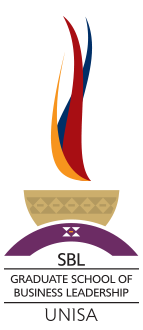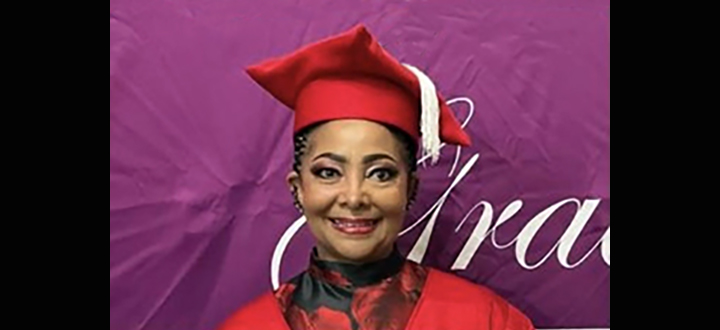

Newly minted Doctor of Business Leadership graduate, Dr Trudy Forbay
Dr Trudy Forbay's journey is one of remarkable resilience, academic prowess and a deep commitment to shedding light on overlooked experiences. An educator by profession, Forbay is currently serving as the first female Executive Director (acting) in the history of Unisa’s Department of Study Material, Production and Delivery (SMPD) in the Portfolio: Operations and Facilities Management. Additionally, she serves on the executive committee of Unisa’s Women’s Forum.
Forbay is a newly minted Doctor of Business Leadership graduate from Unisa’s School of Business Leadership (SBL). And not so long ago, she graduated as one of the participants in the Franklyn Covey-Unisa Talent Tenacity Programme where she received the Top Achiever Award for the Senior Management cohort.
Married for over 30 years and a mother of two, her professional journey was not without pitfalls. She remarks that the experiences inspired the title of her doctoral study, The "other Blacks": An intersectional perspective on the lived experiences of Coloured women leaders within South African organisations, which explored how the intersection of race, gender and class impact Coloured women leaders within the workplace and society. As a Coloured woman leader exploring the lived experiences of leadership of other Coloured women, she used rigorous strategies to ensure the quality and integrity of her research, such as artwork and poetry.
Forbay states that most South African intersectional studies focus on Black women as a collective. Some of these studies, she says, footnote Coloured women’s experiences of leadership specifically. "This footnoting of Coloured women’s stories is epistemically violent," says Forbay. "The study, thus, disrupts the silencing of the Coloured voice in both the transformation and decolonisation project in South Africa. It provides a contextual understanding of Coloured women’s marginalised leadership experiences within contemporary South African organisations. In addition, the study makes an important contribution to gender transformation practices across sectors and stands to inform government policy."
The methodological approach used by Forbay in her research, including the use of poetry, provided a roadmap on how doctoral candidates could, to some degree, evidence reflexivity in practice, as they execute their intersectional grounded theory studies. She notes: "Another methodological contribution of the study – with some epistemic humility – relates to business school research in South Africa. The use of poetry within South African business schools might contribute to the decoloniality project as academic writing in English. However, this does not necessarily come easy for those students whose mother tongue is not English or have challenges expressing themselves in English, and for professional doctoral students for whom academic writing is foreign."
Continuing, Forbay says that the use of poetry illustrates the interpretive potential of arts-based methods to generate new ways of knowing, such as, she says, eliciting multiple and reflexive meanings, and generating new insights. "These benefits strongly connect with poetry’s potential to open up new ways of understanding, feeling, and seeing lived experiences," she emphasises.
To her knowledge, this is the first comprehensive intersectional study that foregrounds the lived experiences of Coloured women leaders in the country. Forbay says that the study is, therefore, "timeous for an understanding of how the interaction of race, gender, and class influences Coloured women’s experiences of leadership. The conceptual framework that was developed from the data is the study’s original contribution to knowledge. It lays the groundwork for the development of new theory."
At the beginning of the path that laid the foundation for her doctoral journey, Forbay was diagnosed with renal failure. Despite her health challenges, she remained steadfast and focused, so much so that she garnered two first prize awards for papers she presented at the 7th World Conference on Research Integrity (WCRI) in Cape Town. "The theme of the conference," she says, was "Fostering research integrity in an unequal world".
Reflecting on both her personal and professional tribulations and triumphs, Forbay says that the care, love, support and understanding from her family kept her going. She makes special mention of her supervisor at SBL, Prof Peliwe Mnguni, and her line manager, Matsiababa Motebele, Vice-Principal of Operations and Facilities at Unisa.
Concluding her message, Forbay says that as a person whose life was saved by an organ donor, she wishes to encourage Unisans to become part of the opt-in organ donation system, where individuals can actively register to become organ donors.
* By Godfrey Madibane, Acting Journalist, Department of Institutional Advancement
Publish date: 2025-06-12 00:00:00.0
Contact the Marketing and Communication office: Ms Thami Kaunda at kaundn@unisa.ac.za
011 652 0339
Telephone: +27 11 652 0248 / +27 11 652 0291
Email: sbl@unisa.ac.za
Physical Address:
Cnr Janadel and Alexandra Avenues
Midrand, 1686
Gauteng, South Africa
Download map & directions (PDF)